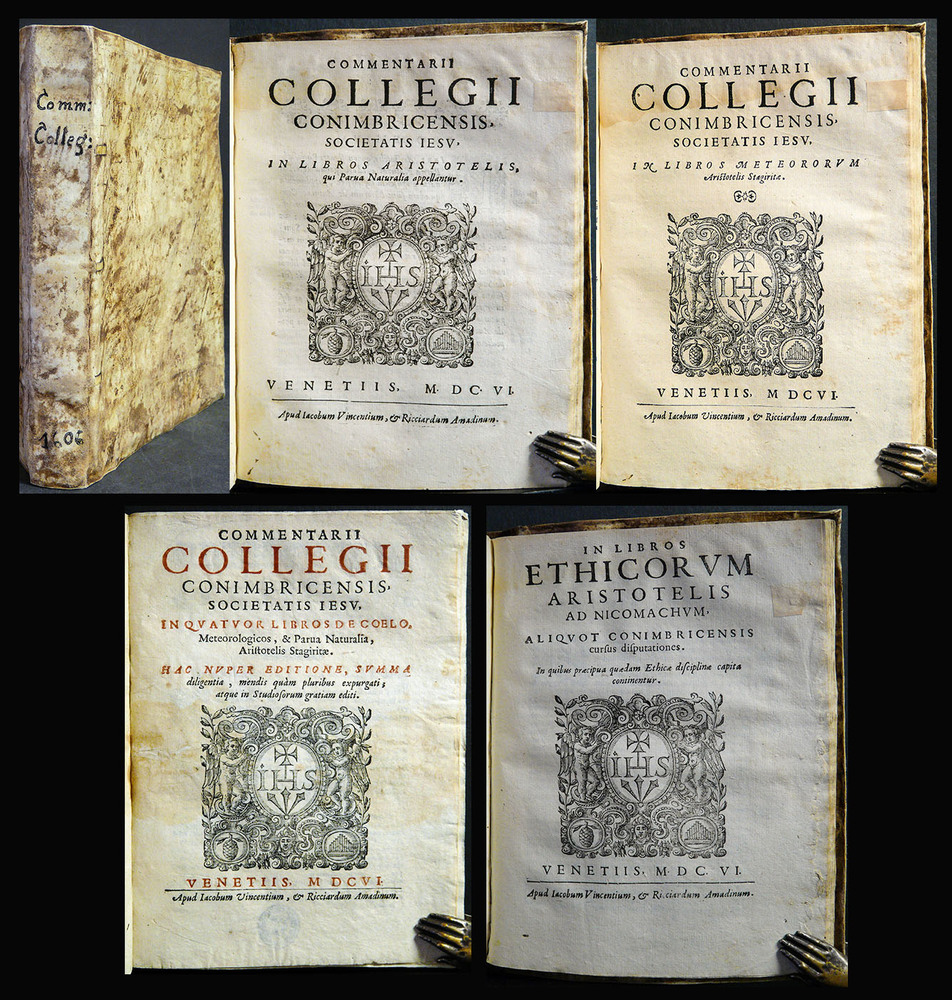Aristotle, Stagirita (384 BC – 322 BC): Commentari Collegii Conimbricensis Societatis Iesu, in quatuor libros de coelo meteorologicos & parua naturalia, Aristotelis stagiritae
€850,00
Aristotle Stagirita Ἀριστοτέλης (384 – 322 BC)
COMMENTARII COLLEGII CONIMBRICENSIS, SOCIETATIS IESU, IN QUATUOR LIBROS DE COELO, METEOROLOGICOS, & PARUA NATURALIA, ARISTOTELIS STAGIRITAE
Venetiis : apud Jacobum Vincentium, & Ricciardum
Amadinum, 1606
Description : [in 4to] – pp. (16), col.660; pp. (4), col.182, pp.(9); pp.(2), col.126, pp.(6) ;
pp.(6), col.116, pp (7).
ARISTOTLE. PHILOSOPHY. Four books bound together in one volume. The present copy is a well preserved early XVII century glossed edition printed in Venice, by Vincentium and Ricciardum Amadinum, of Aristotle´s three works on physics De Caelo, On the Heavens Meteorologica , Treatise on Metereology, Parva Naturalia , (Little Natural Principles) and his revered work on ethics Ethica Nicomachea. On the Heavens (or “De Caelo”) is Aristotle’s chief cosmological treatise: it contains his astronomical theories. According to Aristotile the heavenly bodies are the most perfect realities (or “substances”) whose motions are ruled by principles other than those of bodies in the sublunary sphere. The latter are composed of one or all of the four classical elements (earth, water air, fire) and are perishable; but the matter the heavens are made of is imperishable aether, so they are not subject to generation and corruption. Hence their motions are eternal and perfect and the perfect motion is the circular one which can last eternally selfsame. As substances, celestial bodies have matter (aether) and a form, the philosopher in fact did regard them as living entities similar to living beings with a rational soul as their form.
Meteorology (or “Meteorologica”) is a text which contains the Aristotelian theories about the earth sciences. These include early accounts of water evaporation weather phenomena, and earthquakes. Here Aristotle discusses the Prime mover principle. This abstract and invisible idea precedes our current Newtonian understanding of gravitational force. The book is then followed by the Parva Naturalia , ( Little Natural Principles) dealing with the topics of memory (de memoria) of sleeping and dreaming with a crude analysis of the circadian rhythm, (de somno et vigilia) as well as other subjects like breathing (de respiratione) and the cycle of life from childhood ( de juventute) to the old age ( de senectute) till death ( de vita et de morte).
The last part is the Nicomachean Ethics or Ta Ethika, it is an important and widely acclaimed work on virtue and moral character which plays a prominent role in defining Aristotelian ethics. It consists of ten parts based on notes from his lectures at the Lyceum and were either edited by or dedicated to Aristotle’s son, Nicomachus. Nicomachean Ethics focuses on the importance of habitually behaving virtuously and developing a virtuous character. Aristotle emphasized the importance of context to ethical behavior, and the ability of the virtuous person to recognize the best course of action. Aristotle argued that eudaimonia is the goal of life, and that a person’s pursuit of eudaimonia, rightly conceived, will result in virtuous conduct.
Full limp vellum contemporary binding, handwritten titles on spine, exlibris on first pastedown, good interiors with usual minor spotting and some light watermarks, a few marginal wormholes in a few pages. Four individual titlepages with woodcut printer´s device for each part, the first titlepage in double colour, red and black. Very elegant Venetian edition printed in neat typefaces cancellersco and tondo on two columns, many woodcut decorated initials, head and tail pieces and some woodcut geometrical illustration in the first part. A very nice copy of this classical work of greek philosophy.
Nice copy in Good Antiquarian Conditions
Cfr.: R. BOLGAR, The Classical Heritage, pp.179-181; Diogenes Laertius, Lives of the Eminent
Philosophers, ed. and trans. R.D. Hicks, vol.I, pp. 444-482 ; COPAC UK Warburg Institute Library,
London, ref. ACH 1250; C.H. HASKINS, Studies in the History of Medieval Science, p.368; F.E.
PETERS, Aristotles Arabus, 17, 33; D. WINGATE, The Medieval Latin Versions of the Aristotelian
Scientific Corpus, 60.
– Eur 1.150




